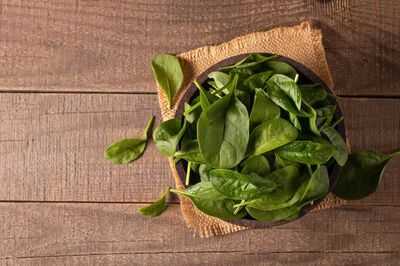
An easy-to-prepare two-ingredient salad might help reduce blood pressure levels. Studies have indicated that this particular pairing could prove vital in combating this "silent killer" condition.
High blood pressure means your heart must work harder than normal to circulate blood throughout the body. Over time, this places additional strain on vital organs.
Without treatment, this can result in numerous life-threatening conditions including strokes and heart disease. Diet is one factor that contributes to high blood pressure.
Consuming excessive salt whilst not eating sufficient fruit and vegetables can cause levels to increase, for instance. Consequently, modifying your diet can also help bring levels down.
Adding a combination of two ingredients to your meals could be one method to help accomplish this.

Beyond creating a delicious dish, both spinach and balsamic vinegar are thought to possess blood pressure-reducing properties. Research published in Clinical Nutrition Research in 2015 discovered that consuming spinach daily for seven days reduced both systolic and diastolic blood pressure.
The research team from St Michael's Hospital in Toronto, Canada, determined the advantages stemmed from the elevated nitrate content found in spinach. The Food Standards Agency states that spinach ranks amongst the primary sources of dietary nitrate, along with lettuce. Nitrates work by widening and relaxing both arteries and veins.
This eases pressure on the heart by enhancing blood flow to the cardiac muscle. For the research, scientists recruited 27 people with "normal" blood pressure readings.
Participants consumed either a high-nitrate soup made from spinach (containing 845 mg of nitrates) or a low-nitrate asparagus soup (with just 0.6 mg of nitrate daily).
The research found: "High versus low-nitrate intervention also reduced central systolic and diastolic blood pressure and brachial systolic blood pressure at 180 minutes following seven-day supplementation only.
"These findings suggest that dietary nitrate from spinach may contribute to beneficial hemodynamic effects of vegetable-rich diets and highlights the potential of developing a targeted dietary approach in the management of elevated blood pressure."
Systolic pressure represents the top figure in a blood pressure reading and indicates how forcefully your heart pumps blood throughout your body. Diastolic pressure (the bottom figure) measures the resistance to blood flow within your blood vessels.
Elevated blood pressure is defined as 140/90 millimetres of mercury (mmHg) or above (or 150/90mmHg or above for those aged over 80). Scientists have also discovered that vinegar, a popular ingreident in salad dressing, can help lower blood pressure.
A study published in the Bioscience, Biotechnology and Biochemistry journal in 2001 found that a particular element in vinegar could be effective in combating hypertension. It stated: "As a result, it was observed that acetic acid itself, the main component of vinegar, significantly reduced both blood pressure and renin activity compared to controls given no acetic acid or vinegar, as well as vinegar.
Find out about the symptoms you need to watch out for and get health advice with our free health newsletter from the Daily Express
"As for the mechanism of this function, it was suggested that this reduction in blood pressure may be caused by the significant reduction in renin activity and the subsequent decrease in angiotensin II.
"From this study, it was also suggested that the antihypertensive effect of vinegar is mainly due to the acetic acid in it."
The NHS advises the following steps to lower your blood pressure:
- Maintain a healthy, balanced diet
- Get regular exercise - try to complete at least 150 minutes of physical activity each week
- Shed excess weight if you're carrying too much
- Limit your salt intake - steer clear of salty foods or adding salt when cooking
- Keep alcohol consumption in check - don't exceed 14 units per week regularly
- Cut back on caffeine - this includes coffee, tea and fizzy drinks like cola
- Quit smoking
Anyone worried about their blood pressure levels should consult their GP.
You may also like

AIIMS Bhopal introduces PAE as safer alterative for Benign Prostatic Hypertrophy management

Football: Liverpool, Manchester United looking to build on wins in Premier League

Exclusive: Is Baseer Ali out from Bigg Boss 19 in double eviction?

Abu Dhabi rolls out variable speed limits on Sheikh Zayed Road: What motorists must know about the new system

Arunachal: BRO's Project Arunank celebrates 18th Raising Day at Naharlagun






